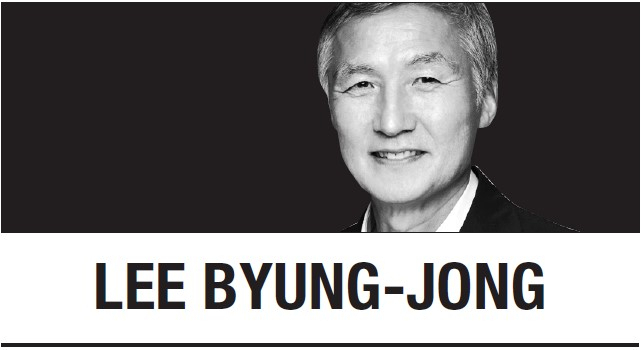
Amid the earth-shattering geopolitical changes of today, what should be South Korea’s new foreign policy objective in the coming new year? I would like to propose a membership of the G9 (Group of Nine). Together with Australia, Korea could try to become a new member of the rich countries’ club, currently limited to the G7 (the US, Canada, the UK, France, Germany, Italy and Japan). By joining the club, Korea can transform itself from a rule-follower to a rule-setter of global governance.
That possibility is not high, but not impossible either. Many pundits in international relations have recently proposed that idea as Korea’s position in the world ascends continuously. In a column early this year, Ronald Klain, President Biden’s former chief of staff, argued that the G7 has to be expanded into the G9, including Korea and Australia, as a counter-weight to the ever-growing BRICS. The five-member alliance of the emerging economies (Brazil, Russia, India, China and South Africa) recently accepted five new members (Saudi Arabia, UAE, Iran, Egypt and Ethiopia) to become a powerful political bloc largely composed of authoritarian countries. Klain believes the G9 of democratic countries can successfully curb the authoritarian slanting of the world.
Korea’s former Foreign Minister Park Jin elaborated that logic in a press meeting last month. Korea’s membership “will significantly expand the vision and philosophy of the G7,” Park said. “It not only helps Korea, but also promotes the democracy, free market, human rights and rule of law upheld by the G7.” He added "G7 Plus" has been a key project of the Yoon Suk Yeol administration as part of its efforts to make Korea the Global Pivotal State that plays a more active role in international affairs. Park said the next G7 Summit in Canada in June 2025 will be a turning point for its possible expansion
As the most powerful member of the G7, the US no doubt has the biggest say in admitting any new members. In that regard, incoming President Trump is not totally against the G7’s expansion. While in office, he in fact proposed to turn the G7 to the G10, including Korea, Australia and India. He even floated the idea of the G11, including Russia. Now that Russia and India are out of question due to Russia’s invasion of Ukraine and India’s increasingly authoritarian Hindu nationalism under Prime Minister Modi, analysts say, Korea and Australia remain the only viable candidates.
In many aspects, Korea fully qualifies as a new G9 member. Korea is one of only seven countries in the world that have a population of more than 50 million people and a per capita income of more than $30,000. Its per capita income is now larger than that of Japan. Korea’s trade volume is bigger that those of Italy and Canada. In terms of population size, Korea is also greater than Canada. Korea’s mature democracy, coupled with a vibrant market economy, is in par with those of the current seven members. Additionally, Korea boasts a highly attractive pop culture that captivates many young fans around the world.
Analysts believe the fast-changing geopolitical landscape of the world urgently requires the G7’s expansion. The world is increasingly divided into the democratic and authoritarian blocs, exemplified by the US-China confrontation. As noted, BRICS is gaining more support from the non-West world of Global South. In addition to five new members, dozens of other authoritarian countries, such as Turkey and Belarus, wish to join BRICS, challenging the US-led global world order. Currently, the G7 accounts for only 10 percent of world population, compared with 45 percent for BRICS. In terms of gross domestic product, the G7 makes up 30 percent of the world’s total, smaller than 35 percent for BRICS. While the G7’s economies grow by an average of 1.7 percent per year, that number is 4.4 percent for the BRICS.
Amid a waning G7 influence in the world, there have been some efforts to rectify that. The G20 was born out of that need. But the G20 has also faltered recently due to a divide within the organization between democratic and autocratic members. The G20 is not the only international organization deadlocked due to the surging ideological chasm in the world. The United Nations is also suffering from inertia as its Security Council is sharply divided between the three Western permanent members (the US, the UK and France) and the two non-Western members (Russia and China).
Given the necessity for the G7’s expansion that can fill the void left by the sluggish UN and the G20, Korea needs to lobby actively for a G9 membership. The biggest hurdle in that attempt could be Japan. As the only Asian member of the G7, Japan naturally opposes any new Asian members that can dilute its influence. Yet recent rapprochement between Seoul and Tokyo could alter Japan’s position. The trilateral partnership among Seoul, Tokyo and Washington, forged firmly under the nudging of President Biden, can be another drive for Korea’s membership. Amid an ever-strengthening security alliance among North Korea, Russia and China and ensuing military threats in the region, Washington and Tokyo have all the more reasons to embrace Seoul. It would be wonderful if that embracement comes in the form of a G9 membership.
Lee Byung-jong
Lee Byung-jong is a former Seoul correspondent for Newsweek, The Associated Press and Bloomberg News. He is a professor at the School of Global Service at Sookmyung Women’s University in Seoul. The views expressed here are the writer’s own. -- Ed.